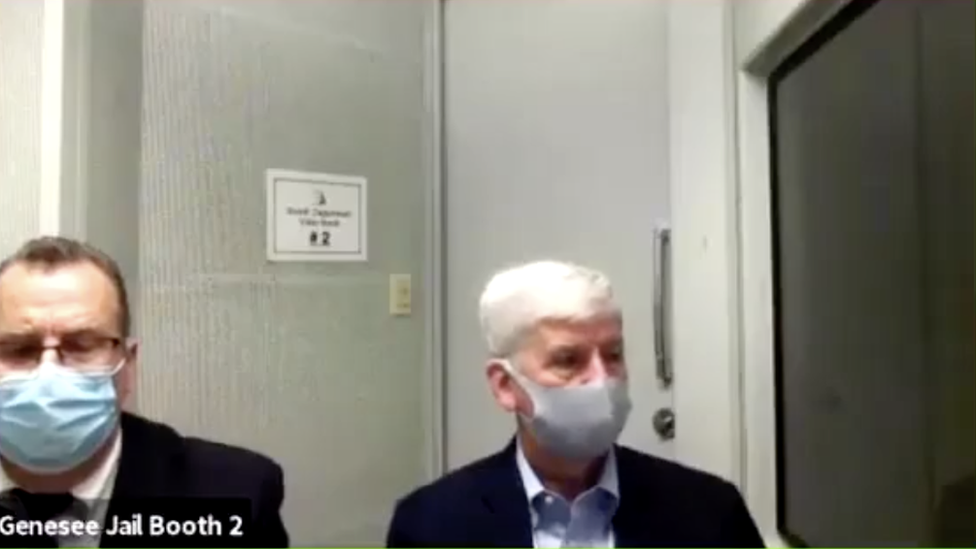Flint water crisis: Michigan charges ex-governor Rick Snyder
- Published
Flint resident Melissa Mays: 'Our hair fell out'
Michigan's former governor has pleaded not guilty to wilful neglect of duty over the deadly contamination of water in the city of Flint.
Rick Snyder, 62, could face up to a year in jail if convicted of the misdemeanour charge.
State prosecutors filed indictments against eight other defendants.
The crisis drew national attention after 12 people died when the city switched its water supply to the Flint River in 2014 in a bid to save money.
An outbreak of Legionnaires' disease followed, and residents were found to have drunk water poisoned with lead.
Nine manslaughter charges have also been levelled against the state's former health director.
The criminal charges follow a new investigation into the case. Prosecutors dropped previous charges in 2019, pledging a more thorough probe.

Snyder appeared in court with his lawyer via Zoom
On Thursday, Michigan Attorney General Dana Nessel announced that the state's former health director, Nick Lyon, would face nine charges of involuntary manslaughter.
If found guilty, each charge carries a sentence of 15 years in jail. He had originally been charged with two manslaughter counts, but those charges were dropped in 2019. He pleaded not guilty on Thursday.
A lawyer for Mr Snyder, a Republican, said before Thursday's hearing at the Genesee County jail: "We believe there is no evidence to support any criminal charges against Governor Snyder."
During his court appearance on Thursday, Mr Snyder only spoke three words - "yes, your honour" - confirming that he still lived in Michigan.
He was told he could not leave the state without the court's permission. He is accused of two counts of wilful neglect of duty and was freed after paying a $10,000 (£7,300) bond.
The environmental disaster attracted global attention as activists accused officials of racism. Flint is a majority-African American city, where over 40% of the residents live in poverty, and some suggested that authorities' indifference to the community led to the crisis.
What happened in Flint?
In 2014, when Mr Snyder was governor, Flint switched its water supply away from the system of the nearby city of Detroit. Instead of drawing water from Lake Huron, it instead used the Flint River.
Flint was in a financial state of emergency and the switch was meant to save the city millions of dollars.

Former Governor Rick Snyder faces two counts of willful neglect of duty
But the water from the river was more corrosive than Lake Huron's and was not treated properly. This caused lead - a powerful neurotoxin - to leach from the pipes.
Residents started noticing problems with the water. One family in 2016 told the BBC that the tap water sometimes came out blue or yellow, and that all five family members began to lose their hair and developed painful rashes.
Despite this, local officials denied anything was wrong for more than a year, even as residents complained that the water tasted and looked strange.
Bacteria in the water was also blamed for an outbreak of Legionnaires' disease - a serious type of pneumonia - that resulted in 12 deaths.
The drinking water crisis drew national attention, and became known as one of the worst man-made environmental disasters in US history.
In 2016 Governor Snyder apologised to the Flint community and said that government at all levels had failed the city. President Barack Obama said Flint had been "short-changed" and declared a state of emergency for the city, releasing federal aid.
A report commissioned from a government-appointed civil rights group said that "systemic racism" helped to cause the crisis., external
The city has since switched back to using Detroit's water system. However, many local residents still rely on bottled water for drinking, cooking and washing, saying they no longer trust the government.
Thousands of residents have filed lawsuits against the state of Michigan over the water scandal.
In August, the state announced that it had reached a preliminary settlement to pay $600m (£439m) to victims of the crisis.
What did officials say?
In a news conference on Thursday hosted by the state's attorney general, Wayne County Prosecutor Kym Worthy said that "the impact of the Flint water crisis will span generations.
"It has nothing whatsoever to do with partisanship. It has to do with human decency, resurrecting the completely abandoned people of Flint and finally holding people accountable. This case is about justice, truth, accountability, poisoned children, lost lives."
Michigan solicitor general Fadwa Hammoud called the contamination a "categorical failure of public officials at all levels of government who trampled upon [the public's] trust and evaded accountability for far too long".
"There are no velvet ropes in our criminal justice system. Nobody, no matter how powerful or well connected, is above accountability when they commit a crime," she added.
"When an entire city is victimised by the negligence and indifference of those in power, it deserves an uncompromising investigation that holds to account anyone who is criminally culpable."
Why were the previous charges dropped?
In 2019, prosecutors dropped all criminal charges against eight officials awaiting trial over the water crisis. This included Michigan's former health director Nick Lyon, who was accused of involuntary manslaughter.
Seven officials had already taken plea bargains where the accused pleads guilty to a lesser charge in exchange for a lighter sentence or agreement that other charges will be dropped.
The prosecutors, who assumed control of the investigation earlier that year after a new attorney general was elected, said "all available evidence was not pursued" by the previous team, and promised to launch a new and more thorough probe.
Aleem Maqbool on the Flint, Michigan, water crisis - and beyond